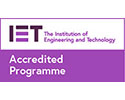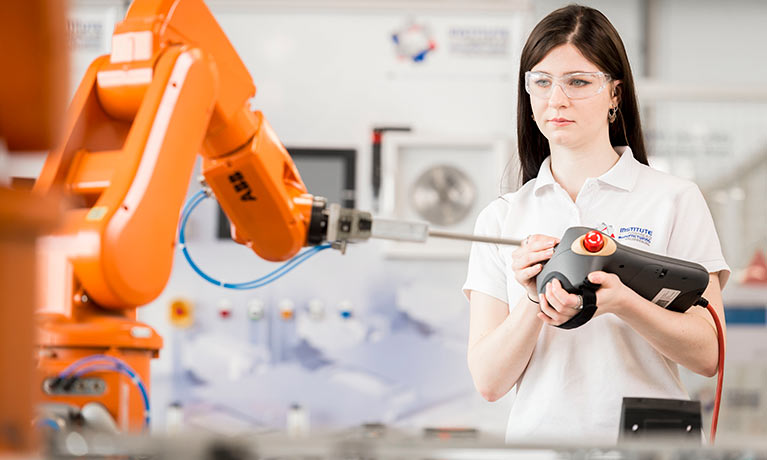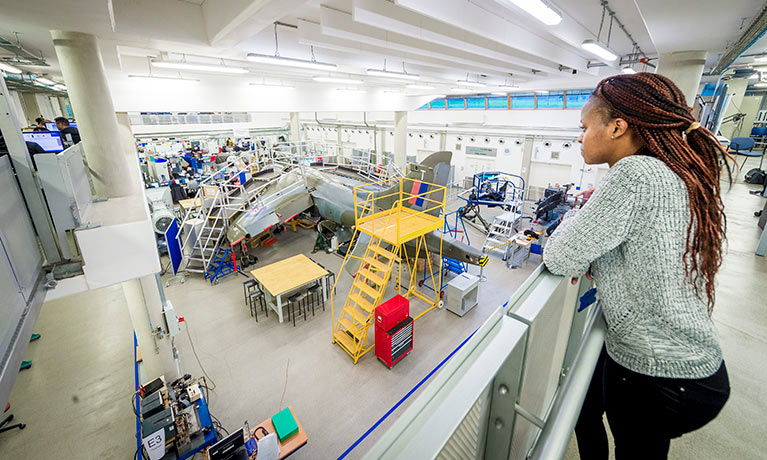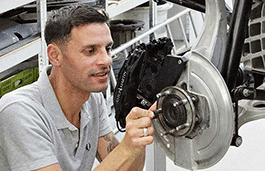Search
Production Engineering and Operations Management MSc
Study level: Postgraduate
If you would like to pursue a managerial role in factory operations, this MSc in Production Engineering and Operations Management could help you take that next step up.
Year of entry
2024-25
Location
Coventry University (Coventry)
Study mode
Full-time
Sandwich
Duration
1 year full-time
2 years sandwich
Course code
EECT055
Start date
September 2024
January 2025
Course overview
The overall aim of the course is to advance your abilities within the area of production engineering and operations management so you can assist manufacturing companies to meet these demands head-on – achieving competitive advantage and making an impact on profits and sustainability.
- We will encourage you to evaluate engineering design and process choices around materials, production technologies and production processes. You will then have the opportunity to design solutions to complex production engineering and operations management problems using 3D computer solid modelling and the latest industry-standard software, interfacing with current leading production machines.
- You will be required to study many of the more popular approaches being used to improve manufacturing processes with a view to making companies more productive and cost-efficient, namely lean and agile manufacturing.
- We also aim to cover some of the latest industry trends around automation techniques, including various robot types, robot programming, programmable logic controllers, sensors, vision systems, motion control, safety systems, and design for manufacture. You will have the opportunity to gain practical experience in online and offline robot programming.
- You will have the option to apply for a ‘professional work placement’ opportunity2, designed to further develop your skills and knowledge with the aim of maximising your employability prospects. See modules for more information.
Rated Gold Overall
Teaching Excellence Framework (TEF) 20235 QS Stars for Teaching and Facilities
QS Stars University RatingsTop 5 Student City in England (Coventry)
QS Best Student Cities Index 2025Why you should study this course
- A distinct advantage of our course is its vocational nature. We use real-life case studies and examples from local and regional industries, including automotive, aerospace, mechanical and engineering services and their supply chain.
- You may have opportunities to access the facilities of the Institute for Advanced Manufacturing and Engineering (AME), which can enable you to put your learning into practice, working on actual problems in collaboration with Unipart to find solutions to current and emerging industrial challenges4.
- Teaching is informed by our strong portfolio of industrial research. Many of our academics come from an industrial background and are research active, engaged either in their own individual research area or as part of one of the University’s research institutes (Please note staff may be subject to change).
- Our industry connections may enable us to deliver a programme of exciting guest speakers, which in the past have included speakers from the BSI (British Standards Institution), Jaguar Land Rover, Rolls Royce and others from within the UK supply chain (guest speakers are subject to availability).
- Your studies will be split between our Engineering and Computing buildings and the Institute for Advanced Manufacturing and Engineering (AME), based at Unipart’s Coventry site. You can experience the latest technology on the manufacturing front line, which includes £3m of robotic automation, forming, joining, analysis and simulation, metrology and product verification technology4.
- You will have the chance to learn to identify opportunities for the application of new materials and processes and evaluate appropriate production control systems. At the same time, you can develop the skills to assess manufacturing issues with regard to strategic and financial implications, as well as work effectively in a team environment.
Accreditation and professional recognition
This course is accredited1 and recognised by the following bodies:

Institution of Engineering and Technology (IET)
This course is currently accredited up to and including the September 2025 intake by the Institution of Engineering and Technology (IET) on behalf of the Engineering Council as meeting the requirements for Further Learning for registration as a Chartered Engineer (CEng). Candidates must hold a CEng accredited BEng/BSc (Hons) undergraduate first degree to comply with full CEng registration requirements.

Chartered Management Institute (CMI)
As part of this course, you will undertake a professional development module which is currently accredited by the Chartered Management Institute for the 2024-25 intake. Upon successful completion of this module, you will gain the CMI Level 7 Certificate in Strategic Management and Leadership Practice at no additional cost. Coventry University’s accreditation with CMI is currently ongoing for the relevant modules and is regularly reviewed and monitored by the CMI through its quality systems.
What you'll study
The course culminates with your dissertation, which provides an opportunity to apply the theories and techniques you have learned. It may focus on one area of study or involve a combination of subjects. In the past, students have considered topics such as comparison of industry across global sectors, the introduction of ERP (enterprise resource planning) systems, innovation of methods and techniques from one industry sector to another, design of automation or robotics etc.
Your project can be industry-based if you are already working or wish to gain an internship-style industrial experience during the third semester2. For example, solving specific production problems experienced by a company, investigating the use of new technologies like 3D printing, evaluating potential uses of new materials or production techniques or designing new systems or components for efficiency.
With the programme being so closely related with AME, there may also be opportunities for involvement with ongoing research projects run as part of the Institute’s normal research activities (subject to availability, application, meeting any applicable visa requirements and may incur additional costs).
With work placement pathway
The ‘With work placement’ opportunity2 enables you to apply in semester 1 for an optional work placement of up to 12 months, extending the duration of your master’s to 24 months. The placement provides an opportunity for you to develop expertise and experience in your chosen field with the aim of enhancing your employability upon graduation. The work placement would take place in semesters 3, 4 and 5.
Please note that the optional placement modules will incur an additional tuition fee of £4,000. Placement opportunities may also be subject to additional costs, visa requirements being met, subject to availability and/or competitive application. Work placements are not guaranteed but you will benefit from the support of the Talent Team in trying to find and secure an opportunity. Find out more about the work placement option.
We regularly review our course content, to make it relevant and current for the benefit of our students. For these reasons, course modules may be updated.
How you'll learn
Teaching methods include:
- Lectures
- Case studies
- Simulations
- Tutorials
- Individual and group exercises and projects
Teaching contact hours
The number of full-time contact hours may vary from semester to semester, however, on average, it is likely to be around 12 contact hours per week in the taught semesters. Additionally, you will be expected to undertake significant self-directed study approximately 30 - 35 hours each week, depending on the demands of individual modules.
Your project-based semester will be supervisor supported, self-directed study in the region of 38 hours per week as well as supervisor meetings around 1 hour per week and where appropriate workshops supporting your project which can add up to 10 additional hours across your project semester.
The contact hours may be made up of a combination of face-to-face teaching, individual and group tutorials, and online classes and tutorials.
As an innovative and enterprising institution, the university may seek to utilise emerging technologies within the student experience. For all courses (whether on-campus, blended, or distance learning), the university may deliver certain contact hours and assessments via online technologies and methods.
Since COVID-19, we have delivered our courses in a variety of forms, in line with public authority guidance, decisions, or orders and we will continue to adapt our delivery as appropriate. Whether on campus or online, our key priority is staff and student safety.
Assessment
This course will be assessed using a variety of methods which will vary depending upon the module. Assessment methods may include coursework assignments, which could involve design, analysis and experimentation, or computer simulation. Assessment methods may also include written assessments, presentations, posters, tests, exams, oral examinations and formal reports.
The Coventry University Group assessment strategy ensures that our courses are fairly assessed and allows us to monitor student progression towards achieving the intended learning outcomes.
Entry requirements
Typical offer for 2024/25 entry.
Fees and funding
2024/25 tuition fees.
| Student | Full-time | Part-time |
|---|---|---|
| UK, Ireland*, Channel Islands or Isle of Man | £11,200 | £4,000 (Work placement option additional fee) | Not available |
| EU | £11,200 | £4,000 (Work placement option additional fee) per year with EU Support Bursary** £20,050 | £4,000 (Work placement option additional fee) per year without EU Support Bursary** |
Not available |
| International | £20,050 | £4,000 (Work placement option additional fee) | Not available |
For advice and guidance on tuition fees3 and student loans visit our Postgraduate Finance page and see the university's Tuition Fee and Refund Terms and Conditions.
We offer a range of International scholarships to students all over the world. For more information, visit our International Scholarships page.
Tuition fees cover the cost of your teaching, assessments, facilities and support services. There may be additional costs not covered by this fee such as accommodation and living costs, recommended reading books, stationery, printing and re-assessments should you need them.
The following are additional costs not included in the tuition fees:
- Any optional overseas field trips or visits: £400+ per trip.
- Any costs associated with securing, attending or completing a placement (whether in the UK or abroad).
*Irish student fees
The rights of Irish residents to study in the UK are preserved under the Common Travel Area arrangement. If you are an Irish student and meet the residency criteria, you can study in England, pay the same level of tuition fees as English students and utilise the Tuition Fee Loan.
**EU Support Bursary
Following the UK's exit from the European Union, we are offering financial support to all eligible EU students who wish to study an undergraduate or a postgraduate degree with us full-time. This bursary will be used to offset the cost of your tuition fees to bring them in line with that of UK students. Students studying a degree with a foundation year with us are not eligible for the bursary.
Facilities
Our aim is to offer you sector-leading facilities4.

Faculty on the factory floor
AME brings together academia, industry, and research and development in a ‘live’ manufacturing environment. Our collaboration with Unipart gives you the opportunity to work with some of the most talented engineering professionals in the UK.

High Performance Engineering Centre (HPEC)
Situated on the ground floor of our Engineering and Computing Building, the centre houses flight and driving simulators, a chassis design assembly and test facility, wind tunnels and a fleet of CNC manufacturing machines.

The Library
The Lanchester Library is open 24/7, 364 days a year and has 1,400 study spaces, including group and silent areas. It also currently offers more than 550 computers and an additional 120 free-to-loan laptops.
Careers and opportunities
Upon successful completion, you will have knowledge of:
- The evaluation of current and emerging materials and their associated manufacturing processes and technologies.
- The optimisation of production engineering and production operations management using appropriate mathematical, statistical and simulation methods, recognising the limitations of these methods.
- The critical appreciation of the engineering and management challenges in global production operations including the ethical, legal, social, environmental and economic constraints.
- The systematic understanding of digital manufacturing technologies and approaches and the impact that digital artefacts and digital data has on the competitiveness of manufacturing environments.
You will be able to:
- Formulate innovative solutions to real-world problems and challenges with incomplete data through an ability to synthesise current and leading-edge knowledge.
- Evaluate the limitations of current and emerging products and technologies against both technical as well as commercial constraints.
- Design creative solutions to current and emergent problems by taking a holistic technical and non-technical perspective, including commercial and sustainability concepts.
- Apply appropriate engineering analysis methods for solving complex problems within production operations management, recognising any limitations and commercial and industrial constraints.
- Critically appraise how new knowledge is generated within production engineering and production operations management.
On successful completion of this course, you should have developed as a manufacturing engineer and increased your knowledge of the application of technology and developed your business and management skills. You could go on to pursue a successful career in manufacturing industry in roles, which typically include manufacturing engineering, process planning, production planning, quality, systems improvement, projects and operations management.
Where our graduates work
Graduates on similar courses have gone on to secure roles in production engineering and manufacturing management.
Graduate Immigration Route visa
Based on current information from the UK Government, international students whose study extends beyond summer 2021 may be eligible for a visa under the UK Government’s Graduate Immigration Route, which will enable students to stay and work, or look for work, in the UK at any skill level for up to two (2) years. Check the most up to date guidance available to check your eligibility and any updates from the UK Government before making an application or enrolment decision.
How to apply
You may also like





